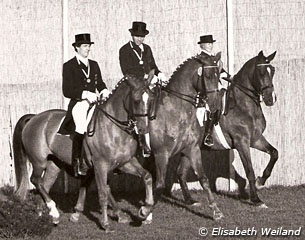
The name Schulten-Baumer must ring a bell in the equestrian world. Almost everybody involved in dressage sport will immediately think of Isabell Werth’s great mentor Dr. Uwe Schulten-Baumer senior, whose stepdaughter Ellen has been a steady German team member at the 2007 and 2009 European Championships. Unfortunately slowly fading from people's minds is Dr. Uwe Schulten-Baumer’s identically named son
, who was one of the youngest and most successful international dressage riders of the 1970s until the mid 1980s.
Uwe Junior’s remarkable international career, which spanned about 15 years and included 13 championship medals, is strongly associated with a huge Hanoverian gelding called Slibowitz. This horse became one of the most reliable team horses Germany has ever had.
Slibowitz was born in 1969 in Bütlingen near Lüneburg and was bred by Manfred Reinstorf. Judged by his pedigree he wasn’t really intended to become a dressage horse. Hanoverian’s successful dressage sires of that time like Duellant, Velten xx, Marcio xx or Der Löwe xx were not to be found in the colt’s papers. His sire Servus is said to have been the best offspring of Sesam, a grandson of the Trakehner foundation sire Semper Idem, who founded his own lineage in Hanoverian breeding. On his dam Angelina’s side Slibowitz went back to a second foundation Trakehner, the legendary Abglanz.
At the beginning of the 1970s Hanoverian breeding had noble blood influenced representatives like Van Eick, Liostro, Lucky Boy or Mazepa, but also heavy and by today’s standard old fashioned looking horses like the chestnut Armagnac – both types proved to be very successful. Slibowitz counted more amongst the latter type, being heavy bodied with a not so noble head and rather short strong limbs.
So it was not natural beauty or charm that caught the eyes of visitors at the Verden auction in 1973, but Slibowitz’ other qualities, which were also noticed by Dr. Uwe Schulten- Baumer and his son. The latter was just 19 and had already competed successfully in the junior division in Germany on Wisby and Palazzo, both trained by his father, a steel manager with a great feeling and passion for horses from his childhood days.
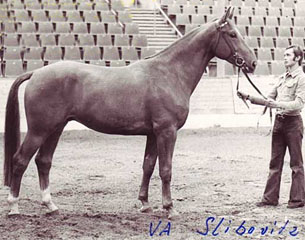 Father and son were looking for a young hopeful and the Junior recalled how impressed he was seeing Slibowitz in Verden for the first time. “He had a great natural impulsion and an outstanding elasticity. We were so convinced of his high quality and talent we bought him only seen in hand and without test riding him," Uwe junior reminisced.
Father and son were looking for a young hopeful and the Junior recalled how impressed he was seeing Slibowitz in Verden for the first time. “He had a great natural impulsion and an outstanding elasticity. We were so convinced of his high quality and talent we bought him only seen in hand and without test riding him," Uwe junior reminisced.
All too often people reduce the word "talent" to the quality of the movements and the way the hindlegs are engaged. But a certain kind of temperament and character can hinder even the most talented horse to use its abilities or slow down its development. With Slibowitz it was just the opposite and the Schulten-Baumers had double luck: Their new Hanoverian proved to own the best character and attitude a rider can hope for. “Slibowitz was an absolutely outstanding horse. He was completely obedient, relaxed and learned very easily, always trying to make it right for me” said Uwe junior.
Uwe Junior had moved his horses to the quite new training centre of the DOKR (German Olympic Riding Committee) in Warendorf when he began his studies in human medicine in Münster in 1974. There the legendary Willi Schultheis, Otto Lörke’s most influential student and at that time German national coach, trained him daily. Later Schulten-Baumer’s father came over to support his son every weekend and at shows of course.
Slibowitz’ superb character and the high quality training he experienced enabled him to mature at a fast and steady speed from year to year. He started his career in some suitability competitions before he moved on to L- and M-level dressage in his first real season in 1974. The just 5-year old earned several placings and a year later had, according to his rider, his first start at S-level at the CDI Donaueschingen. The same year this reliable horse even won his first S-competitions up to Intermediaire I level.
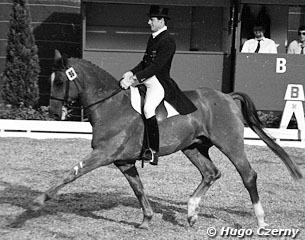 Although such a straight forward career may looked like a forced progression it definitely wasn’t. Dr. Uwe Schulten-Baumer junior already had two very good liver chestnuts to compete at Grand Prix level: the Hanoverian Palazzo, who went on to show in the 1976 Olympic Games for Italy, and the Westfalian Feudal. More likely Slibowitz offered so much just by himself that he became a Grand Prix horse aged 7, though he stayed in Feudal’s shadow in 1976 as this horse, one year older, was selected for the Olympic trials.
Although such a straight forward career may looked like a forced progression it definitely wasn’t. Dr. Uwe Schulten-Baumer junior already had two very good liver chestnuts to compete at Grand Prix level: the Hanoverian Palazzo, who went on to show in the 1976 Olympic Games for Italy, and the Westfalian Feudal. More likely Slibowitz offered so much just by himself that he became a Grand Prix horse aged 7, though he stayed in Feudal’s shadow in 1976 as this horse, one year older, was selected for the Olympic trials.
Only a year later the friendly Hanoverian, “who was a very nice and well behaved horse in the stable and everywhere else,” surprised his rider and took over the lead from Feudal in the internal “stable ranking.” The judges obviously liked Slibowitz’ appearance, who placed in silver medal position at the 1977 German championships behind Harry Boldt’s great Hanoverian Woyzeck, Germany's hope to dethrone Granat. Christine Stückelberger and her Holsteiner were unbeaten for almost 3 years then.
As one of the youngest horses showing at the European championships Slibowitz represented Germany in St. Gallen for the first time and not only won a team gold, but moreover he earned a much respected individual bronze medal with his only 23-year old rider. Uwe Senior told Eurodressage he had always believed in the potential of Slibowitz, but would have never expected him to be that successful in the horse’s first European Championships. It was a great success and some kind of repayment for Junior’s disciplined training in the early mornings or late evenings while managing his time consuming studies. Just like the legendary Josef Neckermann, Schulten-Baumer was a very busy man and one of the few true amateur riders in a sport which increasingly professionalized at that time.
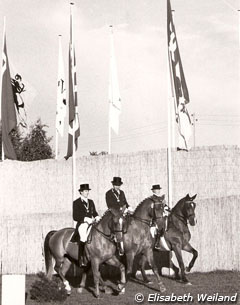 One may ask what made Slibowitz that impressive from early on. His great strength was his ability to shorten and lengthen his strides easily in every of his impulsive gaits. His transitions from short collected strides to long extended ones were one of a kind and with a fluency that even today only a few horses are able to show in such a way. Of course Slibowitz had a great talent and a unique elasticity, but his ability was also the result of his training.
One may ask what made Slibowitz that impressive from early on. His great strength was his ability to shorten and lengthen his strides easily in every of his impulsive gaits. His transitions from short collected strides to long extended ones were one of a kind and with a fluency that even today only a few horses are able to show in such a way. Of course Slibowitz had a great talent and a unique elasticity, but his ability was also the result of his training.
Dr. Uwe Schulten-Baumer senior’s way of training dressage horses, which gained even more fame when Isabell Werth became extremely successful, includes working Grand Prix horses deep and low, a thing every horse profits from if it is done properly and in the right way. It is a pity Schulten-Baumer’s method is sometimes mentioned in the controversy about the extreme forms of training horses deep and round, because there is a clear difference between his way and e.g. hyperflexed/rollkur riding, which blocks the engagement of the hindlegs and back. These, however, are absolutely essential to Schulten-Baumer. The value of his training system can be seen in the outcome. All of Senior's horses use their hindlegs in a very active way by stepping under and they are very good examples how horses use their back while being ridden. Slibowitz was the prime example.
In 1978 the 9-year old placed second in the Grand Prix and Special at Wiesbaden and Aachen, both times behind Germany’s number 1, Woyzeck. Harry Boldt’s horse had challenged Germany’s greatest rival Granat several times and with this good form at Aachen the Germans hoped Woyzeck would finally be able to beat him at the World Championships in Goodwood, held only a week after the CHIO. Little did anyone know it would be the other Hanoverian chestnut who turned out to be Granat's biggest rival.
Dr. Uwe Schulten-Baumer junior stated Slibowitz was a totally uncomplicated traveler, but the journey from Aachen to England took its toll on all the German team horses, including the two Trakehner geldings Ultimo, ridden by Gabriela Grillo, and Hirtentraum of Uwe Sauer. They were loaded right after the Aachen show on Sunday evening, but the sea crossing had to be delayed due to bad weather. As a result it became a very long journey with the horses arriving in Goodwood on Tuesday having a fever. Luckily they all recovered soon.
Slibowitz lived up to the expectations by placing 3rd in the Grand Prix, almost 100 points behind the winner Granat, who seemed even more intangible than before leaving 2nd placed Woyzeck far behind. But in the individual competition something more unpredictable happened.
Slibowitz undoubtedly was in top shape and focused like usual. His performance, right before Granat had to go, thrilled everybody and put Stückelberger under pressure. The Hanoverian had a mistake breaking in canter in the extended trot and his piaffe was less brilliant, but the rest of the test was of such superior quality that many were convinced this was the end of Granat’s reign and they had seen the new World Champion.
This assumption was even more confirmed when Granat did not perform at his usual standard, being a bit over the top that day and giving his tiny rider a hard time to get him collected. Slibowitz would have been a deserved World Champion, but it was not meant to be. Granat still beat him by 19 points, though two judges had felt like the majority and had placed Slibowitz 1st.
“It was probably Slibowitz’ greatest success, though other wins in his later years mean even more to me personally," Uwe Junior stated.
After the surprising outcome of Goodwood many were convinced it would only be a matter of time until the 174 cm huge chestnut would beat Granat. The hopes were justified when Slibowitz won at Aachen, but Granat wasn’t there. At the European championships in Denmark he neared Granat closer than ever before, only 5 points behind him in the Grand Prix. So the result of the Grand Prix Special must have been a disappointment when Slibowitz finished only 4th after showing weak piaffe, a movement that never was his forte.
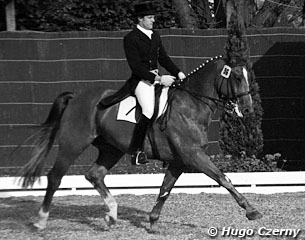 1980 should have been Silbowitz’ Olympic year, but the infamous Russian invasion in Afghanistan led Germany and most important other equestrian nations boycotting the Moscow Games. He competed in the Alternate Olympic Festival at Goodwood instead. There he showed a very good form again and impressed like two years earlier with his hallmarks, his wonderful transitions between collection and extension and the impulsion, which he even kept in the collected movements. Slibowitz ended with two second places, a team gold and an individual silver medal, won against the best in the world but lacking true Olympic glory. These Games was the last international championship for the 11-year olds.
1980 should have been Silbowitz’ Olympic year, but the infamous Russian invasion in Afghanistan led Germany and most important other equestrian nations boycotting the Moscow Games. He competed in the Alternate Olympic Festival at Goodwood instead. There he showed a very good form again and impressed like two years earlier with his hallmarks, his wonderful transitions between collection and extension and the impulsion, which he even kept in the collected movements. Slibowitz ended with two second places, a team gold and an individual silver medal, won against the best in the world but lacking true Olympic glory. These Games was the last international championship for the 11-year olds.
Slibowitz remained one of the world’s best dressage horses, winning the most renowned international Grand Prix classes at Berlin, Dortmund, Rotterdam, Munich, Aachen and Goodwood, but luck was not on the horse’s side in the 1980s.
At the 1981 European championships in Laxenburg (Austria) he sustained a hock injury prior to the show and had to be replaced by his stable mate Madras, who ironically achieved the longed victory over Granat and finally enabled Dr. Uwe Schulten- Baumer junior to win an individual gold medal. Madras remained his championships horse from 1981 to 1985. Slibowitz still won on the international stage, but from now on stayed a bit in the shadow of Madras.
Nevertheless Schulten-Baumer junior likes to look back on those last years together because he knew the horse inside out and felt that Slibowitz still liked his job and fought for him even more than before.
In 1984 Schulten-Baumer flew to the Olympic Games as the German reserve rider and he took both his horses to California. Neither Madras nor Slibowitz got the chance to compete on the Olympic stage there as the team horses Ahlerich, Muscadeur and Montevideo remained fit and healthy. But even there Schulten- Baumer felt his faithful companion for more than a decade was not his usual self and not feeling really well, even though nothing in particular could be diagnosed there.
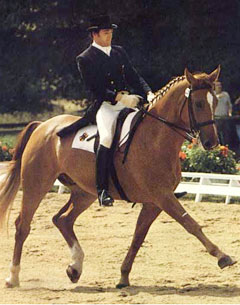
After Slibowitz had returned to Germany his rider brought him to the very renowned veterinary hospital at Hanover University. There the experienced vets finally found out the horse was suffering from stomach cancer. This diagnosis was a terrible blow and the vets attempted an operation to save the wonderful horse’s life. The goal was to give Slibowitz a few more happy years of retirement, something he he had truly deserved, but sadly he had to be put down during this operation.
Uwe junior explained that it was very hard to say goodbye to his horse, which has never had any other rider on his back since he was four. “It was hard," he confessed. "Slibowitz was a great personality, a fantastic horse which was affectionate like usually only dogs are.”
Slibowitz’ goodwill, his extraordinary reliability and consistency at the highest level of dressage for more than a decade are remarkable. More importantly the quality of his performances as a result of his training made Schulten-Baumer's name a hallmark throughout the dressage world even long before Isabell Werth entered it.
Text by Silke Rottermann
To find out more about Slibowitz’ international performances read:
- Reportage der Weltmeisterschaft 1978 in Goodwood, in: Harry Boldt, Das Dressurpferd, Edition Haberbeck, Lage-Lippe 1978, p. 253 – 262 (in German)
Pamela MacGregor- Morris, Pelham Horse Year 1979, Pelham Books, London 1980. - Deutsche Reiterliche Vereinigung (publisher), Reiter '80, Verlag für Sport und Kultur, München 1980 (in German, Italian, Dutch and French, out of print, available second hand)
Photos: Privat - Elisabeth Weiland - Hugo Czerny
Related Link
Granat, From Ugly Duck to Beautiful Swan